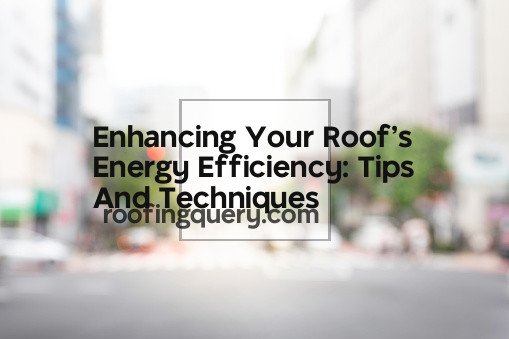If you want to save money and energy, it’s important to make your home as energy efficient as possible. One way to do this is to focus on your roof. By making some simple changes, you can reduce your energy consumption and save money on your utility bills. Here are some tips and techniques for enhancing your roof’s energy efficiency:
1. Make sure your roof is properly insulated. This will help to keep your home warm in the winter and cool in the summer, both of which will save you energy and money.
2. Consider installing solar panels. Solar panels can generate electricity, which can offset your energy costs.
3. Use energy-efficient roofing materials. There are a variety of energy-efficient roofing materials on the market, such as metal roofs, that can help to reduce your energy consumption.
4. Inspect your roof regularly. It’s important to inspect your roof regularly for any damage or leaks. By fixing any issues promptly, you can avoid further damage and save money in the long run.
By following these tips, you can make your roof more energy efficient and save money on your utility bills.
1. What Are Some Tips And Techniques For Enhancing Your Roof’s Energy Efficiency?

When it comes to your roof, making sure it is energy efficient should be a top priority. Not only will this save you money on your energy bill, but it will also help to keep your home more comfortable throughout the year. Here are some tips and techniques for enhancing your roof’s energy efficiency:
1. Make sure your roof is properly insulated. This is one of the most important things you can do to improve your roof’s energy efficiency. Adding more insulation will help to keep your home warmer in the winter and cooler in the summer, which will reduce your energy consumption.
2. Consider installing a reflective roof coating. This type of coating will reflect sunlight away from your home, which can help to keep your home cooler in the summer.
3. Make sure your roof ventilation is adequate. Proper roof ventilation is important for two reasons. First, it helps to keep your attic cooler, which can reduce the amount of heat that enters your home. Second, it helps to remove moisture from your attic, which can prevent mold and mildew from growing.
4. Inspect your roof regularly. It’s important to inspect your roof regularly for any signs of damage or wear. If you catch any problems early, you can avoid more extensive and expensive repairs down the road.
5. Work with a reputable roofing contractor. When it comes time to repair or replace your roof, be sure to work with a reputable contractor who has experience with energy-efficient roofing materials and installation.
By following these tips, you can improve your roof’s energy efficiency and save money on your energy bill.
What Are Some Of The Benefits Of Enhancing Your Roof’s Energy Efficiency?
When you think about making your home more energy-efficient, you probably think about things like insulation and weather-stripping. But one overlooked area where you can make a big difference is your roof.
Here are some of the benefits of enhancing your roof’s energy efficiency:
1. Save money on your energy bills.
2. Help the environment by reducing your carbon footprint.
3. Increase the value of your home.
4. Make your home more comfortable by reducing drafts and temperature swings.
5. prolong the life of your roof by protecting it from the elements.
Now let’s take a look at some of the ways you can make your roof more energy-efficient…
1. Install reflective roof coatings.
One of the easiest and most effective ways to improve your roof’s energy efficiency is to install a reflective roof coating. This will reflect heat away from your home, keeping it cooler in the summer and reducing your air conditioning costs.
2. Install solar panels.
Another great way to improve your roof’s energy efficiency is to install solar panels. Solar panels generate electricity from the sun, which can help offset your energy costs.
3. Add insulation.
Adding insulation to your attic is a great way to reduce heat loss in your home. This can help you save money on your heating bills in the winter.
4. Replace your roof.
If your roof is old and worn out, it might be time to replace it. A new roof will be more energy-efficient and can help improve the value of your home.
5. Check for air leaks.
One of the biggest sources of energy loss in a home is air leaks. Make sure to check your roof for any air leaks and seal them up to improve your roof’s energy efficiency.
How Can You Determine If Your Roof Is Energy Efficient?
As a homeowner, you are always looking for ways to save money and make your home more comfortable. One way to do this is to make sure your roof is energy efficient. Here are a few ways to determine if your roof is energy efficient:
1. Take a look at your energy bills. If you have been noticing that your energy bills have been increasing, it could be a sign that your roof is not as energy efficient as it could be.
2. Check for drafts. If you feel a draft coming from your roof, it means that heat is escaping from your home. This is not only wasting energy, but it is also making your home less comfortable.
3. Inspect your roof. If you notice any cracks or gaps in your roof, it is time to have it repaired or replaced. These cracks and gaps allow heat to escape, making your home less energy efficient.
4. Have an energy audit. This is the best way to determine how energy efficient your home is. An energy auditor will come to your home and inspect it for energy efficiency. They will give you a report of their findings and make recommendations on how to improve your home’s energy efficiency.
If you are concerned about the energy efficiency of your roof, there are steps you can take to improve it. By taking a look at your energy bills, checking for drafts, and having an energy audit, you can make sure your roof is as energy efficient as possible.
What Are Some Common Energy Efficiency Problems With Roofs?
When it comes to making your home more energy efficient, there are a number of different things that you can do. One area that you may not have thought about, however, is your roof. Believe it or not, your roof can actually have a big impact on your home’s energy efficiency. Here are some common energy efficiency problems with roofs:
1. Poor Insulation: If your roof is not properly insulated, it can allow heat to escape from your home. This will not only make your home less energy efficient, but it can also make it more expensive to heat and cool your home.
2. Leaks: Another common problem with roofs is leaks. If your roof is leaking, it can allow moisture to enter your home. This can cause mold and mildew to grow, and it can also lead to higher energy bills.
3. Damaged Shingles: Damaged or missing shingles can also impact your home’s energy efficiency. If your shingles are not in good condition, they may not be able to properly protect your home from the elements. This can lead to higher energy bills and may even cause damage to your home.
If you are concerned about the energy efficiency of your roof, there are a few things that you can do. First, you can make sure that your roof is properly insulated. This will help to keep heat in your home and will make it more energy efficient. You can also check for leaks and make sure that your shingles are in good condition. By taking these steps, you can help to improve the energy efficiency of your roof and save money on your energy bills.
If you have any questions about enhancing your roof’s energy efficiency, feel free to comment below.

